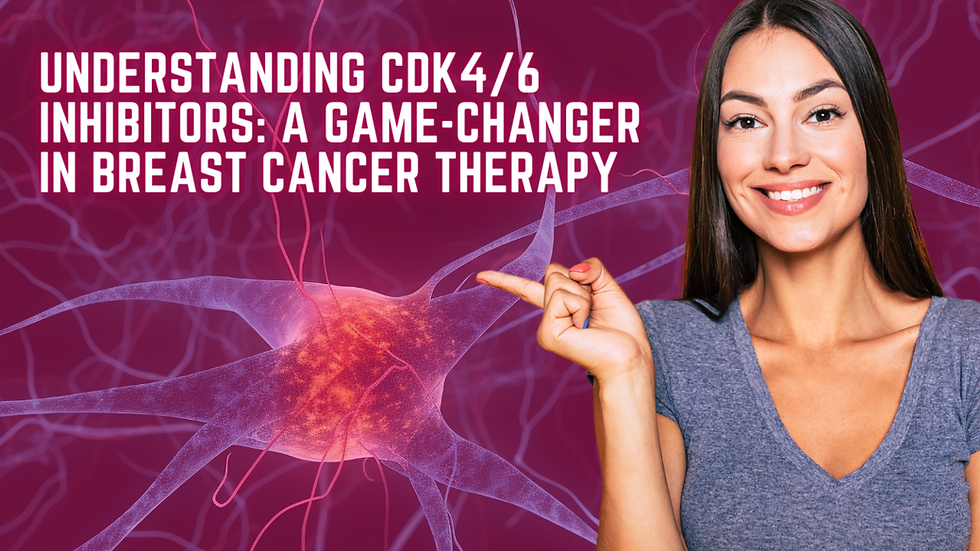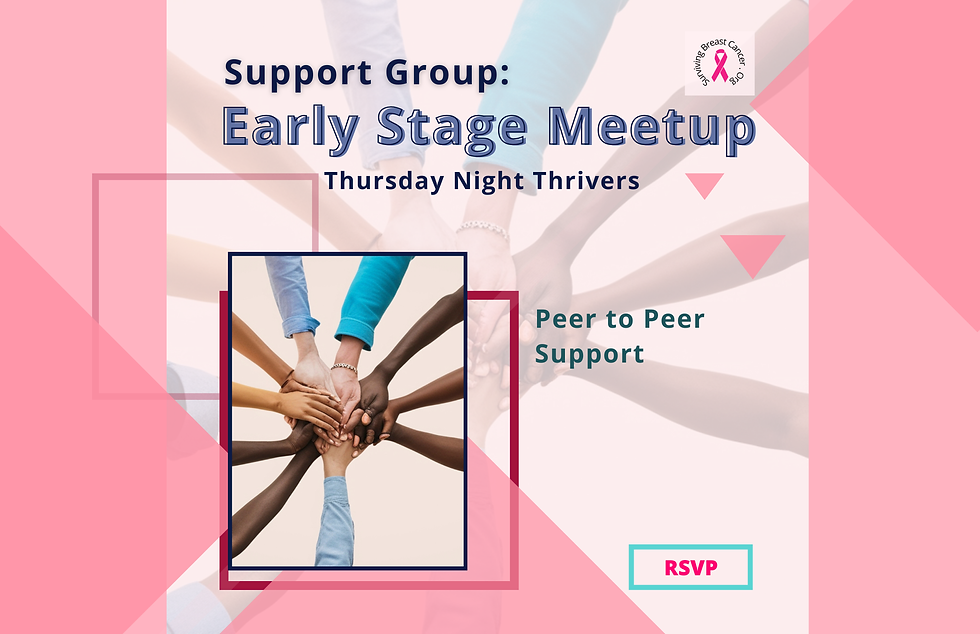Can CDK4/6 Inhibitors Revolutionize Breast Cancer Treatment?
- Surviving Breast Cancer

- Jan 7, 2024
- 3 min read
Updated: Oct 8, 2025

In the realm of breast cancer treatment, advancements in targeted therapies have revolutionized the landscape, offering new hope and improved outcomes for patients. Among these breakthroughs, the emergence of Cyclin-Dependent Kinase 4 and 6 (CDK4/6) inhibitors has sparked considerable enthusiasm and transformed the paradigm of breast cancer management.
Decoding CDK4/6: Unveiling the Molecular Players
CDK4/6 enzymes play a pivotal role in regulating cell cycle progression by partnering with cyclin proteins to facilitate cell division. In breast cancer, aberrant activity of CDK4/6 promotes uncontrolled cell growth and proliferation, contributing to tumor progression. The advent of CDK4/6 inhibitors marks a significant milestone in targeted therapy by specifically targeting these enzymes.
The Role of CDK4/6 Inhibitors in Breast Cancer Treatment
CDK4/6 inhibitors, including Ibrance (palbociclib), Kisqali (ribociclib), and Verzenio (abemaciclib), which is now used in early-stage breast cancer, have emerged as a potent class of drugs that impede (inhibit!) the activity of CDK4/6 enzymes, halting the uncontrolled cell division characteristic of breast cancer cells.
These inhibitors work by binding to CDK4/6, preventing their interaction with cyclin proteins and interrupting the signaling pathways responsible for driving cancer cell growth. By inducing cell cycle arrest (a stopping point in the cell cycle, where it is no longer involved in the processes surrounding duplication and division), CDK4/6 inhibitors exert their anti-cancer effects, ultimately slowing tumor progression.
Clinical Efficacy in Breast Cancer: A Game-Changer in Therapy
CDK4/6 inhibitors have demonstrated remarkable efficacy in the treatment of hormone receptor-positive (HR+) and human epidermal growth factor receptor 2-negative (HER2-) breast cancers, particularly in combination with endocrine therapies.
When used in conjunction with hormonal therapies such as aromatase inhibitors or fulvestrant, CDK4/6 inhibitors exhibit synergistic effects, significantly delaying disease progression and improving overall survival rates in both metastatic and early-stage breast cancer.
Potential Side Effects and Management Strategies
While generally well-tolerated, CDK4/6 inhibitors may cause certain side effects, including:
Neutropenia: Reduced neutrophil counts leading to increased infection risk.
Fatigue: Feelings of tiredness or weakness.
Gastrointestinal Issues: Nausea, diarrhea, or vomiting.
Proactive management strategies include regular blood tests to monitor neutrophil levels, supportive care to alleviate symptoms, and dosage adjustments as necessary.
Expanding Horizons: Ongoing Research and Future Directions
The success of CDK4/6 inhibitors has sparked ongoing research endeavors to further optimize their use and explore their efficacy in different breast cancer subtypes. Clinical trials are investigating novel combinations of CDK4/6 inhibitors with immunotherapies, HER2-targeted therapies, endocrine therapy, and other emerging treatments, aiming to enhance treatment outcomes and expand options for patients.
For example, the Natalee trial, a global Phase III multi-center at the time of this blog post, is a randomized, open-label trial to evaluate the efficacy and safety of Kisqali® (ribociclib) with endocrine therapy as an investigational adjuvant (after surgery) treatment versus endocrine therapy alone in patients with stage II and III HR+/HER2- EBC.
Results previously announced at the American Society of Clinical Oncology (ASCO) Annual Meeting 2023 showed Kisqali plus endocrine therapy, compared to endocrine therapy alone, lowered the risk of cancer recurrence by 25.2%.
Novartis announced similar findings during the 2023 results from the San Antonio Breast Cancer Symposium (SABCS), noting a reduction in risk of disease recurrence in people with stage II and III hormone receptor-positive/human epidermal growth factor receptor 2-negative (HR+/HER2-) early breast cancer (EBC) treated with adjuvant Kisqali plus a non-steroidal aromatase inhibitor as standard endocrine therapy compared to endocrine therapy alone.
Embracing the Promise of CDK4/6 Inhibitors
CDK4/6 inhibitors have emerged as a cornerstone in breast cancer therapy, reshaping treatment paradigms and offering renewed hope to patients. Their synergistic effects with endocrine therapies, coupled with their manageable side effect profile, underscore their significance in improving outcomes for patients with HR+/HER2- breast cancer.
As research continues to unravel the complexities of CDK4/6 inhibitors and their role in breast cancer treatment, their integration into routine clinical practice heralds a new era of precision medicine, promising enhanced therapeutic benefits and improved quality of life for breast cancer patients.
We Want To Hear From You
Are you on a CDK 4/6 inhibitor? What has your experience been? We would love to hear from you and share your story!












